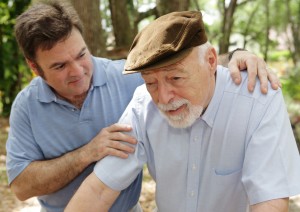Heat Illness and the Elderly: What Caregivers Should Know
 Summer months can bring some blazing hot days that pose challenges for our elderly and senior communities. Recent heat waves on the East Coast have had triple-digit temperatures that can have a tremendous impact to our older loved ones. The culprit is usually dehydration, which diminishes the body’s ability to regulate temperature, which increases the risk of developing heat-related illness.
Summer months can bring some blazing hot days that pose challenges for our elderly and senior communities. Recent heat waves on the East Coast have had triple-digit temperatures that can have a tremendous impact to our older loved ones. The culprit is usually dehydration, which diminishes the body’s ability to regulate temperature, which increases the risk of developing heat-related illness.
Heat-related illnesses are a major concern to seniors and the elderly with 40% of all heat-related deaths in the U.S. being adults over the age of 65. Seniors are less efficient at regulating their body temperatures for several reasons. For example, people over 65 don’t sweat as much as younger adults, which helps the body to cool down and they also store fat differently, which affects their ability to regulate body temperature. Seniors and the elderly also start to experience deterioration to the central nervous system, which makes the body less able to cope with changing body temperatures.
Caregivers need to be mindful of the signs an symptoms of heat-related illnesses among the elderly. Early warning signs of heat exhaustion, which may precede actual heat strokes or other serious heat-related illness, include excessive sweating, fatigue, muscle cramps, prolonged headaches and dizziness. As heat exhaustion progresses, symptoms can sometimes progress to nausea, vomiting or fainting. A heat stroke, in which the internal body temperature rises father than it can be naturally lowered, can strike within 10-15 minute of these symptoms. Actual heat stroke symptoms include extremely high body temperatures, confusion, seizure and coma.
If you are a caregiver for seniors or the elderly and you see your patient experiencing these symptoms, do not hesitate to call 911 immediately. Then, get them in to an air conditioned environment immediately, have them lie down in a cool place or put a fan on them directly. Providing cool liquids or even a cool bath will also help to reduce internal body.
Here are some tips for keeping seniors and the elderly safe in hot weather:
Drink Liquids – Dehydration is the principal cause for most heat-related illnesses. Have your patients drink plenty of water or juice throughout the day, even if they are not thirsty. Remember to ensure that they avoid alcoholic or caffeinated drinks because they can actually contribute to dehydration.
Wear Appropriate Clothes – Have your patients wear light-colored, lightweight, loose-fitting clothes and a wide-brimmed hat.
Stay Indoors During Peak Hours – Keep your patients indoors during the peak times of the day for extreme heat. If they have to be outdoors, try to make it before 10 in the morning or after 6 in the evening. The temperature is much higher in those hours in between.
Reduce Exertion – Ensure that your senior or elderly patients avoid exercise or any type of strenuous activity, particularly outdoors, when outside temperatures are high.
Watch the Heat Index – High humidity, caused by a lot of moisture in the air, impairs the body’s ability to cool itself through sweating. The heat index take into consideration temperature and humidity to determine how hot it actually feels. Caregivers should pay attention to their local heat index, which can be found on weather websites and during the weather forecast on local television or radio station reports. Seniors and the elderly should be kept indoors during high heat index days.
Keep the A/C Working – Caregivers should be mindful of the condition of a senior or elderly patient’s air conditioning unit to ensure that it is fully functioning during extreme heat. If the A/C system does go down, which is not uncommon when it is working overtime in 90+ degree weather, caregivers need to seek other alternatives to get seniors and elderly patients into air-conditioned environments. The mall, libraries and movie theaters are all good options.
For more information about caregiving in Maryland, contact United Medical Care at 1-844-687-7378, or admin@unitedmedicalcare.org, and let us bring health care to your home.
Leave a reply →
